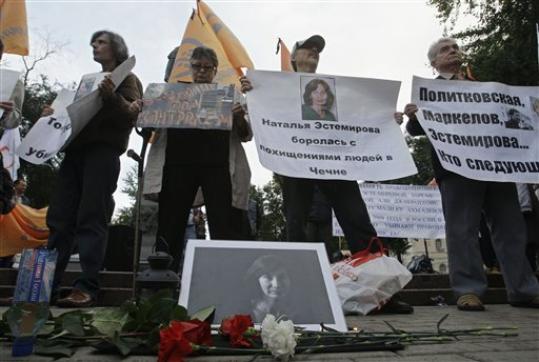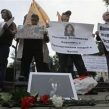
Dagestan Follows in Chechnya’s Footsteps
Publication: Eurasia Daily Monitor Volume: 6 Issue: 171
By:

Chechnya’s experience under the leadership of Ramzan Kadyrov -that is, the ostensible rule of law and order with the local police force seemingly in full control of the situation- could not leave the neighboring North Caucasus republics unaffected. The very public support that Moscow and the federal center lends freely to the Chechen president (www.gzt.ru, August 28) only adds fuel to the fire, as the other North Caucasus governments and law enforcement branches seem unable to win the same approval or acknowledgement of their efforts compared to the hero worship Ramzan Kadyrov receives from the Kremlin. To wit, during his visit to the Dagestani capital of Makhachkala on June 9, President Dmitry Medvedev noted that the roots of the local problems include "continued impoverishment of the populace, high unemployment, staggering corruption and system flaws in governance leading to reduced government effectiveness and the loss of public trust or reputation" (www.i-r-p.ru, June 9). Medvedev, however, did not mention the insurgency in the republic nor offered any words of admiration so commonly heard in Grozny. In all likelihood, the next step to come will be joint operations of Chechen and Dagestani police forces, which is sure to anger the populace who observed the police methods and tactics in neighboring Chechnya with much concern.
The appointment of a former Federal Security Service (FSB) officer, Ali Magomedov, as Dagestan’s new Interior Minister was followed by several attacks targeting human rights activists in the republic. These include the arson attack on the headquarters of the Mothers of Dagestan for Human Rights in Makhachkala (www.regnum.ru, August 24), the letters circulated by the anonymous "association of families of fallen policemen" with a suggested hit list comprised of names of human rights defenders and opposition journalists (www.svobodanews.ru, August 7), as well as continued harassment of the Chernovik newspaper. Meanwhile, the government remarked that "the goal of kidnappings in Dagestan is to discredit law enforcement officers" (www.kavkaz-uzel.ru, September 12). Dagestan’s President Mukhu Aliyev also accused the Memorial NGO of provocations when the latter explored the issues of torture and missing people in the republic (www.gazeta.ru, September 10). According to the Kavkazsky Uzel information agency, 15 people have officially gone missing in Dagestan in 2009.
Human rights activists in Chechnya are not faring any better, as evidenced by the infamous murders of August 2009. Some reports in Ingushetia warned of potential provocation against one of the opposition leaders Maksharip Aushev (www.ingushetiyaru.org, September 12). It appears that the governments across the North Caucasus decided to stop the human rights defenders as well as those who provide independent reports of what takes place in the North Caucasus. In effect, the government ignores the real root of the conflict, preferring instead to target those who provide "inappropriate" (read: different from the propaganda line) information that may tarnish the picture of "total well being" in the region adjacent to the future Olympics site in Sochi.
Meanwhile, on September 11, Dagestan’s government announced the capture of an alleged female suicide attacker planning to blow herself up in Makhachkala (www.rian.ru, September 11). However, certain details cast doubts on the veracity of the government report. The FSB reported the discovery of a letter addressed to a rebel leader in which the captured woman asked to be appointed as a "shaheedah." It is puzzling why this woman, whose three rebel fighter brothers had been killed earlier, had to petition someone to appoint her a suicide bomber, as if applying for a job vacancy. If needed, she could have had direct contact with leaders of local jamaats, with no need to write letters. Indeed, FSB reports from the North Caucasus often elicit a chuckle.
The militant group of Sharia Jamaat (led by Ameer al-Bara, aka Umalat Magomedov, www.vsesmi.ru, May 13) is also using every opportunity to attack law enforcement agencies. On the early morning of September 10 an explosive device was detonated near the village of Kulzeb in Kizilyurt district as a police car was driving by (www.regnum.ru, September 10). The following day, September 11, Makhachkala’s Deputy Prosecutor Maksud Maksudov was assassinated near his house by two unidentified attackers at close range as he was getting into his car (www.news.liga.net, September 12). The same day, machine gun and grenade launcher fire targeted a group of policemen in Kizil-Yurt district (RIA Dagestan, September 11). One policeman was hospitalized.
Government forces are reciprocating strikes by the insurgency. Four rebel fighters were killed during armed clashes on the night of September 11 in Dagestan’s Tabasaran district (www.regions.ru, September 11). The next day, the residence of alleged militants in the north of Makhachkala was raided. Initial reports put the number of rebel casualties at two men (www.interfax.ru, September 12). Later, that number rose to four casualties, including a female. In all likelihood, the house owners were also gunned down during the raid, which resulted in the increased number of casualties. One of the men killed, Bagautdin Kamalutdinov, turned out to be a nephew of the spiritual leader of Dagestan’s militants Bagautdin of Kizilyurt (aka Magomed Kebedov).
Although a leading expert, Alexei Malashenko of the Carnegie Moscow Center, said that the region has no independence fighters (www.zn.ua, September 18), it is difficult to ignore the actions of those who claim to be fighting a war for independence from Russia. Regardless of Russian experts’ and analysts’ opinions to the contrary, the insurgency factor now dominates all other regional issues in Dagestan and the North Caucasus in general, and clashes with the armed opposition forces are the main reason for the tense situation in the region. "Corruption," the favorite catchword of some analysts, is not quite appropriate to describe the current situation in the North Caucasus: corruption there existed fifty, twenty and ten years ago, even in the absence of rebel fighters. The discussion should focus on the role of the insurgency and not on the associated issues.




